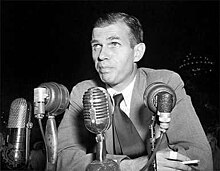Louis J. Russell
Louis J. Russell | |
|---|---|
| Born | Louis James Russell December 16, 1911 HUAC chief investigator |
Louis James Russell (December 16, 1911 – July 2, 1973) was an American special agent and investigator for the Federal Bureau of Investigation, the House Un-American Activities Committee, and a private detective agency involved in the Watergate scandal.[1][2]
Career
Federal Bureau of Investigation
Russell graduated from the Catholic University of America, and joined the Federal Bureau of Investigation on June 7, 1937, as a special agent.[1] Author Jim Hougan characterized Russell as an alcoholic and womanizer,[2] and his resignation was requested in 1944, after misuse of an official automobile.
Anti-communism

In 1945, Russell joined the House Un-American Activities Committee (HUAC) as an investigator. Robert E. Stripling has Russell testify on what he knew about Gerhart Eisler and Hollywood industry people.[3] He also testified about Leon Josephson[4] and Alexander Koral.[5]
By 1948, Russell was a HUAC senior investigator in the Alger Hiss–Whittaker Chambers case. In his memoir Six Crises, Richard Nixon recalled that Russell restrained Hiss when it seemed Hiss was about to strike Chambers.[6] Russell served under Robert E. Stripling and his successor Frank S. Tavenner Jr.[3] Investigators who reported to him included Courtney E. Owens and Donald T. Appell.[7]
He helped uncover evidence of Soviet spy rings and leaks of atomic secrets and materials to the Soviet Union. In 1952, he helped try to find Communist influence in the motion picture industry.[1][8][9] In January 1954, Russell was dismissed by committee chair, Representative Harold H. Velde. Russell had borrowed $300 from actor Edward G. Robinson. In 1956, Russell was rehired and remained with HUAC for a decade.[1]
Private investigator
In 1966, Russell became a private investigator.
Watergate scandal

In 1971, Russell was working for General Security Services a security guard service whose clients included the
According to attorney Gerald Alch, McCord hired "an old associate of his" [Russell] to his company Security International, Inc. Bob Smith, aide and office manager to attorney Bernard Fensterwald recounted that McCord had obtained a contract to provide security to the Republican National Committee. Unable to cash McCord's checks, Russell brought some dozen checks over time to Fensterwald's office at the "Committee to Investigate Assassinations",[11] which Fensterwald would cash. During the Watergate break-in, Russell was checked into a Howard Johnson's Motel across from Watergate.[12]
Russell died of a massive heart attack on July 2, 1973, at his daughter's home in Calvert County, Maryland.[1]
See also
References
- ^ a b c d e f "Louis J. Russell Is Dead at 61; Investigator for Hiss Trial". The New York Times. July 3, 1973. Retrieved May 4, 2019.
- ^ a b c Hougan, J. (1984). Secret Agenda: Watergate, Deep Throat, and the CIA. New York: Random House. pp. xvi, 82, 185.
- ^ a b Meeks, Jack D. (2009). "From the Belly of the HUAC: The Red Probes of Hollywood, 1947–1952" (PDF). University of Maryland, College Park. pp. 137 (Stripling, Tavenner), 193 (Eisler), 200, 228–229 (testimony). Retrieved May 11, 2019.
- ^ "Investigation of un-American propaganda activities in the United States. (regarding Leon Josephson and Samuel Liptzen) by the United States Congress House Committee on Un-American Activities". U.S. Government Printing Office. 1947. pp. 25–28 (Leon Josephson), 32–50 (Russell HUAC bio). Retrieved January 10, 2018.
- ^ Spargo, Mary (April 10, 1948). "Perlo, Koral Face Accuser, Say Nothing: Nervous Witnesses Stand on Rights in Refusal to Answer". The Washington Post.
- ISBN 9780307805669. Retrieved May 9, 2019.
- ^ "Public Hearings". Hearings Regarding Communism in the United States Government. US GPO. August 28, 1950. p. 2843. Retrieved March 24, 2021.
- ^ Meeks, Jack D. (2009). "From the Belly of the HUAC: The Red Probes of Hollywood, 1947–1952" (PDF). The New York Times. pp. 137 (years), 193 (Eisler), 228–299 (Hollywood). Retrieved May 4, 2019.
- ^ "Hearings regarding the communist infiltration of the motion picture industry". US GPO. 2009. pp. 137 (years), 193 (Eisler), 228–299 (Hollywood). Retrieved May 4, 2019.
- ^ Feldstein, Mark (2010). Poisoning the Press: Richard Nixon, Jack Anderson, and the Rise of Washington's Scandal Culture. Farrar, Straus and Giroux. p. 280.
- ^ "CTIA Newsletter Fall 1973" (PDF). Committee to Investigate Assassinations. 1973. Retrieved May 11, 2019.
- ^ Oglesby, C. (1977). The Yankee and Cowboy War. Berkeley Publishing Corporation. pp. 306–307.
External links
- Louis James Russell at Spartacus Educational
- 1947 HUAC Testimony of Louis J. Russell (pp. 296–305, 341–342) at Internet Archive
- 1950 HUAC Testimony of Louis J. Russell (pp. 902–907) at Internet Archive
- Guide to the Congressional Papers (1947–1950) at Nixon Library
- 1952 HUAC Testimony of Walter Bedell Smith at Central Intelligence Agency
